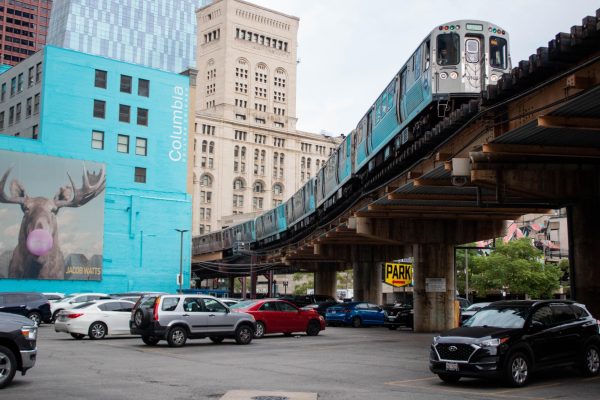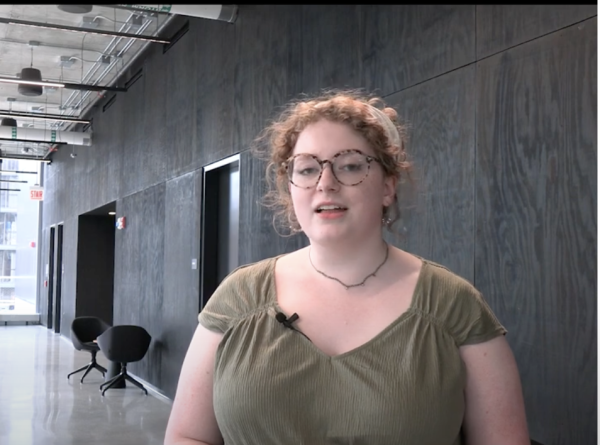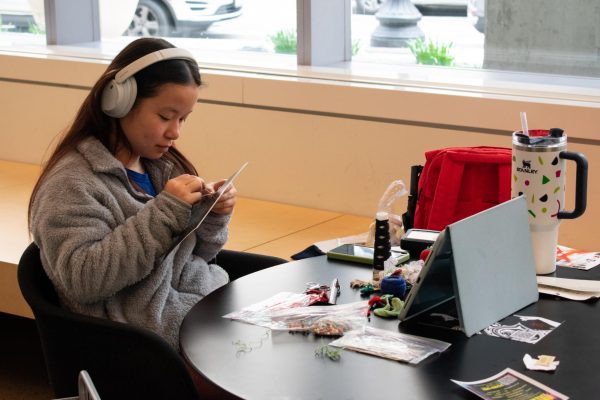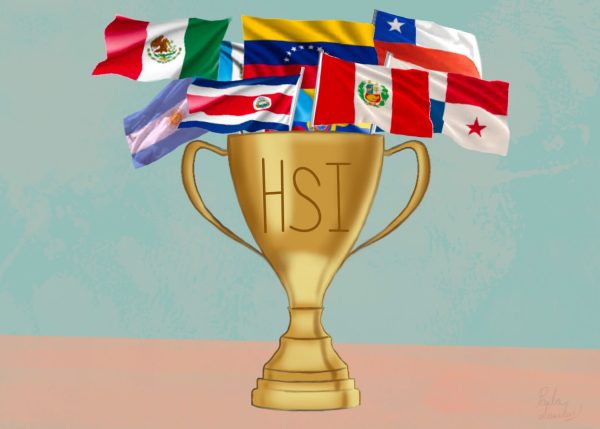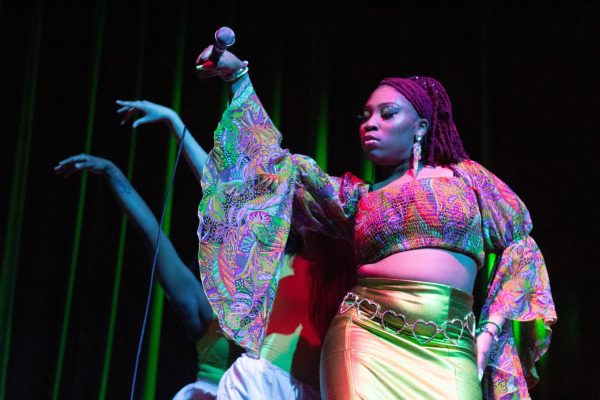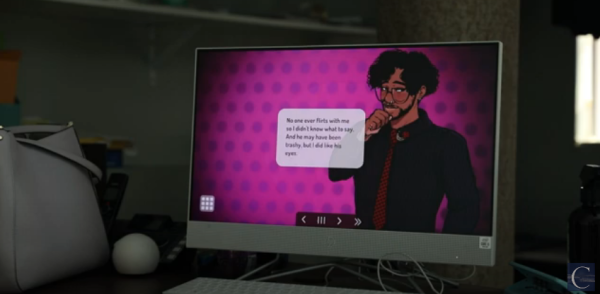The quest to capture youth voters’ imagination continues
November 2, 1998
Alex Heiden is a 24-year old, single man. He moonlights as a bartender and is looking at a promising career on the emergency repair team with a local electrical company. Like everyone else, he drives on public streets and pays a sales tax. Heiden doesn’t vote, however, expressing disgust with the political system and distrust in politicians.
“When there is a candidate worth voting for, I’ll do it,” he said.
Many young Americans, 33 percent in 1996, don’t believe the leaders elected to run their country and determine some of the most pressing aspects of their lives are honest. What they may not realize, however, is that each vote carries with it the innate ability to forever alter America’s future.
It’s not that the next generation doesn’t care or has given up hope. According to an MTV survey, the growing number of young volunteers sheds light on the fact that 18-24 year olds are taking stock in their communities. Nonetheless, there appears to be an ironic shortage of young voters turning up at the polls, an act that some experts attribute to this growing cynicism toward politicians. It may reflect the media’s unrelenting urge to uncover political scandal and a politician’s own weapon to win – attack advertising.
Though they were never a major force in determining an election outcome, young voters are moving closer to extinction. In the presidential election of 1996, only 17 percent of voters were under 30 years old, according to a Rock The Vote survey. In fact, they only represented 30 percent of their age bracket, a difference of two million people from 1992. A 1997 UCLA study has reported that youth interest in politics is at an all-time low, a factor that may be due to a change in cultural influences.
The League of Women Voters, Common Cause, Alliance for Better Campaigns, Rock the Vote, Kids Voting USA and dozens of other organizations are on the Internet and on the streets trying to get the word to new voters that their vote counts.
“We want to teach young people about the political process,” says Pamela Case, public relations coordinator for Kids Voting USA. “When they turn 18, we want voting to be less of a decision and more of a habit. It will be a way of life. We try to teach that voting does make a difference.”
The network of Kids Voting USA reaches 40 states and the District of Columbia. Illinois is included, and a program for Chicago schools is being implemented for the 2000 Presidential election.
Cook County Clerk David Orr believes that young adults are most strongly swayed by popular cultural opinion, which does not promote a sophisticated understanding of politics. In relating youth of the 90s to those in generations past, Orr noted that youth issues, such as the Vietnam War, are no longer readily applicable.
“There is not a lot today that is an overwhelming cultural influence,” he said. Youth of the 90s are “a totally different generation than just 25 years ago … the political spectrum now is just so narrow.
“One specific vote may or may not have affect on a particular election, but it is the act that it symbolizes,” added Orr. “Politicians pay attention to how much registration there is and who’s voting.”
Orr lobbied for the National Voter Registration Act of 1993, also known as “Motor Voter,” and won the battle to get it properly implemented in Illinois.
Another factor excluding young people from the polls is the recent phenomenon of attack advertising. In the weeks before an election, air waves may seem crowded with candidates airing their opponent’s dirty laundry. Money and technology, Orr said, has given every candidate the ability to run a facade for voters.
“You can make anyone look bad,” he explained. “And you can take anyone, even Hitler, and make that guy look good.”
The media seems to have jumped on the campaign bandwagon as well, questioning candidate funding ethics on the evening news. Whether the allegations for each candidate are proved true or not, Orr said the system has become prostituted with big business trading money for favors.
Perhaps the most poignant reason why young Americans don’t vote is because they simply don’t have a firm grasp of the political process. To combat this, the Illinois Women’s League of Voters has initiated a Student Vote program. It focuses on elementary and high school students to ensure they are politically informed when they turn 18. Teachers are encouraged to host a mock election with forums and debates among the students. The program, according to League member Marcia McConnell, works for “providing a better opportunity for students to learn about the process.”
Young Americans also don’t hold a stake in local government or major political reforms concerning issues such as child care or
property tax changes.
“The younger you are, the less effect you see,” said Orr.
To magnify this, politicians tend to ignore youth issues. It’s simply a matter of proper politics; they would rather focus on concerns regarding demographic groups that consistently vote, such as the elderly.
“Politicians are going to focus on the voters they can rely on,” McConnell said.
“Every day our local, state and federal government representatives make decisions that directly affect our lives and our livelihoods,” said State Board of Elections Project Director Yvonne M. Smith. “Many of us complain about the results of these decisions, yet we don’t speak out and tell our elected officials what we think.
“Far too often, Americans go unheard because they fail to exercise their most fundamental means of speaking out — their constitutional right to vote,” Smith added.
Though most of his efforts have impacted older generations, Illinois Congressman William O. Lipinski (D-3) has been working to benefit young voters as well. He recently voted to increase Pell Grant maximums, an act that was approved by Congress in early October. Now students will be able to obtain up to $4,500 annually for college tuition, a difference of more than $2,000. Congress’s movement also ensured that the grant maximum will increase again in five years, to $5,800.
According to Lipinski’s Communications Director, Jason Tai, the Congressman also pushed for and gained Senate approval, in lowering Stafford loan rates by approximately one percent and would like to offer parents a tax credit of up to $1,500 for each year their child is in college.
“[Congressman Lipinski] is for an increase in educational funding and an increase in the amount of time needed to pay it back,” Tai said.
Keeping in time with his Democratic counterparts, Tai said the Congressman would also like to see the budget surplus be used to ensure Social Security for young people instead of re-distributing it back to taxpayers. Doing this, Tai said, would assist young voters because it is “protecting the next generation.”
A common misconception among youth is that “my vote doesn’t count.” In an effort to combat this, McConnell is trying to spread the word that it does.
“The system is going to make more of an impact on the individual than the individual will make on the system,” McConnell said. She explained that Americans who do not take the time to vote will be affected through their jobs, finances and educational opportunities. In addition, she noted several historical instances where one vote made all the difference.
In 1845, one vote brought Texas into the Union.
In 1868, one vote, cast by a Senate member so ill he was carried into the Chamber on a stretcher, saved President Andrew Johnson from impeachment.
In 1941, one vote kept selective service from becoming a reality.
In 1960, President John. F. Kennedy won the Presidential election over Richard Nixon by less than one vote per precinct.
For some people, the historical significance is interesting but bears no value on their decision to vote. For others, voting is purely a part of patriotic obligation.
“It’s having a right that many other people in this world don’t have. I vote because I am an American citizen and it’s a freedom that my forefathers fought for,” said Lannah Mitter, 22. Mitter is a college student whose mother was born in Korea during its wartime struggle against communism. Realizing that her ancestors were faced with this type of dictatorship, Mitter sees voting as a freedom not to be taken lightly.
“The threat of communism is very close to my family,” she explained. “I will not take advantage of what people put their sweat and tears into to give me what I have today. If I don’t vote, I don’t feel I have the right to complain about what our government is doing.”
Orr says people should vote simply because those in power are hoping they won’t. With fewer voters, a small number of people will rule the election and determine the outcome. Orr slammed incumbent candidate for Governor, George Ryan, saying that Ryan’s new legislation prohibiting one-punch, straight-ticket voting was an attempt to restrict the number of voters.
Orr reported that 40% of voters used the one-punch option in the last election, taking less than a minute apiece to do so. Without that option this year, Orr said the Cook County ballot, with at least 107 punches, will take voters 10-12 minutes to complete.
“Fewer people will vote,” he predicted, saying that longer lines may inhibit first-time voters from casting a ballot. “There is a good possibility people won’t endure the long lines.”
“That’s why we have this law,” Orr alleged. “Because they [politicians] don’t want people to vote…That, by the way, is why people should vote. Because powerful people don’t want you to.”
When people throw out government by not voting, he added, “sometimes they don’t realize they are throwing out democracy.”
Also contributing Eva Boyer, Carmen DeFalco, Jeanne Galatzer-Levy and Todd Hofacker



